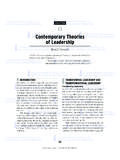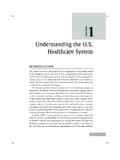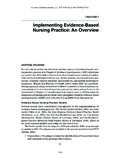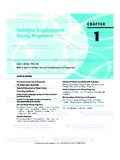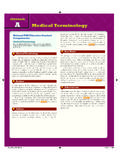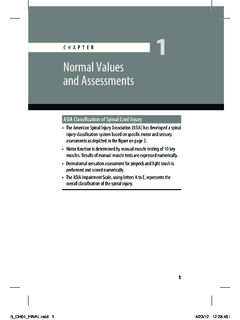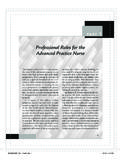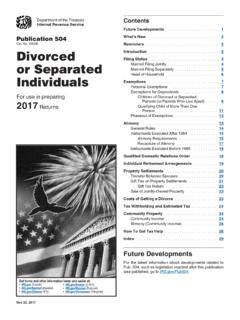Transcription of Foundations of Service-Learning
1 1 Chapter 1 Foundations ofService- learning Kathleen Flecky, OTD, OTR/LThis chapter offers foundational knowledge of Service-Learning byproviding an overview of the discipline s key concepts and defini-tions. It also features a discussion of relevant theoretical and peda-gogical approaches to Service-Learning and a brief history ofservice- learning in the United States. Service-Learning s relevance inhigher education, in general, and education in the health sciencesand occupational therapy, in particular, is also explored. Finally, thechapter includes critiques of Service-Learning as well as a brief sum-mary of trends for Service-Learning in higher OF SERVICE-LEARNINGWhat is Service-Learning ?
2 Although there are a variety of definitions,the essence of Service-Learning rests on a philosophy of service andlearning that occurs in experiences, ref lection, and civic engagementwithin a collaborative relationship involving community unique aspect of Service-Learning is that it incorporates 10/27/09 3:15 PM Page 1 Jones and Bartlett Publishers, LLC. NOT FOR SALE OR DISTRIBUTIONC hapter 1: Foundations of Service-Learningopportunities for students, faculty, and community partners to re-f lect on their interactions and activities in light of both educationaland community objectives. The hyphen between serviceand learningis purposeful; it denotes a balance between the service and learningoutcomes resulting from the partnership stated by Jacoby (1996), Service-Learning is a form of experi-ential education in which students engage in activities that addresshuman and community needs together with structured opportuni-ties intentionally designed to promote student learning and devel-opment (p.)
3 5). This definition differentiates Service-Learning fromother forms of active learning , such as collaborative, cooperative,and problem-based education. Service-Learning engages faculty andstudents with community partners in structured opportunities tomeet academic learning objectives while addressing acknowledgedcommunity needs. Service-Learning is different from volunteerexperiences because of the explicit link of course objectives withstructured community interactions to meet community-driven , civic engagement and ref lection about service are es-sential elements of Service-Learning , which often distinguishes it frominternships (Howard, 2001).
4 According to Eyler & Giles (1999), quality Service-Learning experi-ences include the following components: curricula and projects thatare sustainable and developed in partnership with the community;activities that are meaningful to student learning and communityneeds; a clear and relevant connection of community activities tocourse learning objectives; and purposeful challenges for partici-pants to grapple with diversity and social issues. Service-Learning ischaracterized as the interplay of service and learning , not only withinindividual course settings, but also within the broader academic in-stitutional goals of community engagement.
5 Brown (2001) describesservice- learning as .. expanding educational institutions (and theindividual representatives of those institutions) participation in com-munity, especially in terms of fostering coalitions and creating re-sponsive resources for and with that community .. (p. 5). The conceptual foundation of occupation and occupational ther-apy is an ongoing discussion and conversation featuring 10/27/09 3:15 PM Page 2 Jones and Bartlett Publishers, LLC. NOT FOR SALE OR DISTRIBUTION interdisciplinary theories and applied reference models (Kielhofner,2004; Kramer, Hinojosa, & Royeen, 2003). Similar to the concept ofoccupation, Service-Learning is complex and based on diverse theo-retical constructs, which will be described in the next section.
6 Asservice- learning continues to expand into more courses, curricularmodels, and institutional infrastructures, theoretical concepts anddefinitions of Service-Learning will likely be further delineated and re-fined to meet the civic and social missions of institutions (Maurrasse,2004; Shumer & Shumer, 2005).THEORETICAL AND PEDAGOGICAL APPROACHESAs noted by Howard (1998), .. academic service learning is a peda-gogical model that intentionally integrates academic service learningand relevant community service (p. 22). Service-Learning is not simplythe addition of a service assignment to a course, rather it challenges theteacher, learner, and community partners to connect course materialsexplicitly to service in community with others, thereby necessitatingcommunal and reciprocal theoretical and pedagogical writings and research on Service-Learning frequently cite thework of philosopher John Dewey as the philosophical and pedagog-ical inspiration for experiential, democratic, and civic education andfor Service-Learning (Giles & Eyler, 1994; Stanton, Giles, & Cruz, 1999).
7 Dewey, a naturalistic philosopher, believed that we ref lect and useprior knowledge from experiences to further our growth. The inf lu-ences of Dewey s works on philosophy and epistemology lead to newways of thinking about education as actively connecting knowledgeto experience through engagement in and ref lection on the worldoutside the classroom (Noddings, 1998). Dewey also linked the pur-pose of education to promoting democratic instructional practicesand a more fully democratic society (Dewey, 1916). Dewey wrote:A society which makes provisions for participation in its goodof all members on equal terms and which secures f lexible read-justment of its institutions through interaction of the differ-ent forms of associated life is in so far democratic.
8 Such asociety must have a type of education which gives individualsTheoretical and Pedagogical 10/27/09 3:15 PM Page 3 Jones and Bartlett Publishers, LLC. NOT FOR SALE OR DISTRIBUTIONa personal interest in social relationships and control, and thehabits of mind which secure social changes without intro-ducing disorder. (p. 99)In addition to Dewey, the theoretical insights of David Kolb andDonald Schon on the role of ref lective thinking in experiential edu-cation have inf luenced how pedagogy incorporates ref lection on serv-ice as integral to Service-Learning (Cone & Harris, 1996; Eyler, Giles,& Schmiede, 1996).
9 Kolb s cycle process (Kolb, 1984) ref lection onconcrete experiences, thoughtful observation, abstract conceptual-ization, and active experimentation lead to inclusion of ref lectiveactivities prior to, during, and after service as part of service-learningassignments. Schon s practice of ref lection in action and his recipro-cal ref lection teaching and coaching model (Schon, 1987) have beenused to foster reciprocal ref lective activities among students, faculty,and community partners (Honnet & Poulsen, 1989). Service-Learning also draws on critical theory and feminist pedagogy(Brown, 2001; Deans, 1999). As noted by Friere (1973) and Shor (1987),critical theory emphasizes that education is political and should in-volve a dialectical approach of problem-posing and a critique of socialsystems and the civic responsibilities of education.
10 Feminist pedagogyalso espouses the need for critical ref lection and dialogue related toeducational aspects of privilege and power (Weiler, 1991). These mod-els point to the importance of situating Service-Learning in context withsocial issues and challenges. The development of participatory-actionand community-based research in Service-Learning are examples of howthese pedagogies support community advocacy and give greater voiceto community partners with their strengths and needs (Strand, Marullo,Cutforth, Stoecker, & Donohue, 2003; Reardon, 1998).Finally, in addition to the use of social learning and cognitive learn-ing models, recent development in Service-Learning theoretical frame-works include the use of a pedagogy of engagement (Lowery et al.)
